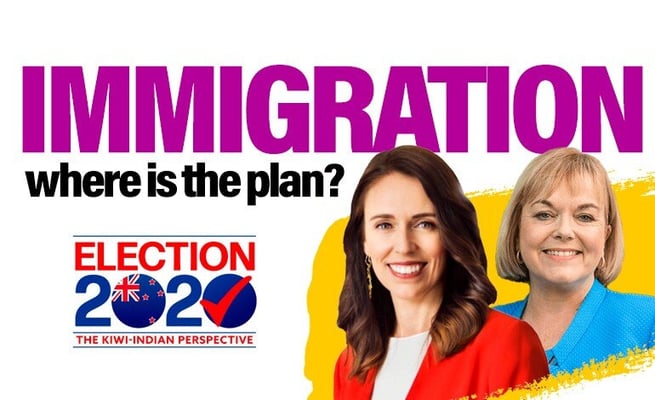Election 2020: Where is the plan for immigration?

In a rare display of convergence of political interests, both Labour and the opposition National Party, have chosen to remain blissfully silent on the “plan on immigration,” for a country that seeks a lot of pride for being a “country that has been built upon immigration.”
The election campaigning has clearly entered in an intense phase where both major parties are attacking and castigating each other’s claim on credibility for managing the complex post-Covid future of our country, however, there is a marked absence of any such “contest” on immigration issues.
Apparently, any such “plan on immigration” is equally abominable for both major parties – Labour and National, and the country does not deserve to know in advance while we deal with “once in a hundred-year pandemic” or “once in 165 years recession.”
This is indeed political-opportunism at its best by both the Labour and the National, despite their respective famed-claims of “caring for the people,” and caring for the “economy.”
Policy on border management is not a policy on immigration
Importantly, both major parties are framing their respective world views on immigration by conveniently emphasising only on “border control,” which at best is a manifestation of hope, and wishful thinking, than a clear plan.
In that regard, both the major parties are falling prey to a long prevalent simplistic assumption that an increase in local unemployment can easily translate into shifting of the workforce in the regions and sectors of the economy experiencing a shortage of labour supply.
It is to say that with forecasts that unemployment can rise up to 12 per cent by February 2021 when more number of jobs that are currently being supported by government’s massive $1.7 billion wage subsidy scheme, will be lost, there is an expectation those workers can easily be retrained and motivated to fill in the jobs that were previously filled by migrant workers.
Both major parties have come up with their respective policies on retraining of the workforce, which, despite being well-intentioned, cannot fully replace with a policy on immigration.
To envisage that NZ will be able to pull out of the first full-blown recession in a decade, which many fear could also be worst in public memory in a century, just on the basis of extremely high-end, high paying “critically skilled workforce” that these major policies are seeming to invite in near term, could again be wishful thinking.
This debate between the importance of “highly skilled or critically skilled workforce” for NZ’s economy has long reverberated within political contestation of ideas on immigration, but the researches have long proved beyond any doubt that the so-called mid-skilled and low-skilled migrant workers are also the backbones of any flourishing economy.
Surprisingly, National also seem to be toeing the line so assiduously advanced by the Labour Party in recent times and giving up on the need for mid and low-skilled migrant workers for the economy.
And this is when the country has collectively experienced in Alert Level 4 lockdowns in recent past when all but so-called low-skilled migrant workers bore the maximum brunt of keeping the economic wheels moving and maintain the supply and delivery of essential services.
The political necessity of winning elections has indeed blurred the collective wisdom and the vision for the future.
Has NZ given up on “temporary migrants stuck overseas”?
To make things further worse and distasteful, political parties of all stripes seem to have conveniently given up on the temporary migrants stuck overseas, who are real people, and till recently were living in New Zealand before Covid-inflicted border closure turned their worlds upside down.
It has been almost seven months that tens of thousands of temporary migrants who were otherwise living in NZ and were innocuously travelling overseas when the borders were closed behind them without a clear warning that they could possibly be permanently locked out of the country.
Majority of them have invested heavily - both financially and emotionally - in making New Zealand as their preferred choice of destination for migrating and starting a new life based on their education and skills and have been living in the country for many years.
Now they face the risk of losing it all as they languish outside NZ borders helplessly, with their legitimate visas expiring with each passing month, and no assurance from the government that their visas will be restored and they will be getting a fair and dignified chance to return and continue with their lives.
If letting them back in NZ and continuing with their lives is not an option, for many of them, the government seems to not be in the mood to offer the basic dignity of allowing them to return temporarily and make decent closure of their dream of Kiwi-life by taking their precious belongings, along with settling their finances for good.
What makes it worse is that despite such an unfair treatment meted out to this fast becoming new underclass of temporary migrants who are being denied entry into the country, despite having legitimate visas issued by Immigration NZ, even the political opposition is also blissfully silent, to offer any “reasonable support” to ameliorate their plight.
What is the major barrier – logistical or ideological?
In that regard, it is indeed important to find out what is the major barrier that the country is facing, in the worldview of the two major political parties, that is preventing from letting temporary migrants stuck overseas back into the country.
While the Labour-led government has assiduously framed it as a logistical challenge, whereby putting it up as an issue that was in direct conflict with the issue of the right to returning of NZ citizens and Permanent Residents, the National has also timidly, and almost cluelessly, towed the line so far.
None of the political party has chosen to stand for the right thing to do under the given chaotic situation of honouring NZ’s visas and the global reputation by letting the temporary migrants return to a country where they have been living for the last few years.
To say that a developed advanced economy like NZ cannot afford to have a few dedicated MIQ facilities that can explicitly cater for the temporary migrants stuck overseas, along with the existing facilities catering for returning Kiwis, does not appear accurate and correct.
It is indeed never a question of a logistical challenge as both the government and the opposition have conveniently made it to be; instead, it is an ideological barrier, preventing both major parties to commit for a dignified return of temporary migrants stuck overseas.
Their ideological barrier is evident from reluctance from both parties to put their stakes on the ground on the entire immigration policy and commit for a bare minimum vision on how they envisage managing the economy without any intake of the mid and low skilled migrant workforce in the near term.
In a rare display of convergence of political interests, both Labour and the opposition National Party, have chosen to remain blissfully silent on the “plan on immigration,” for a country that seeks a lot of pride for being a “country that has been built upon immigration.”
The election campaigning...
In a rare display of convergence of political interests, both Labour and the opposition National Party, have chosen to remain blissfully silent on the “plan on immigration,” for a country that seeks a lot of pride for being a “country that has been built upon immigration.”
The election campaigning has clearly entered in an intense phase where both major parties are attacking and castigating each other’s claim on credibility for managing the complex post-Covid future of our country, however, there is a marked absence of any such “contest” on immigration issues.
Apparently, any such “plan on immigration” is equally abominable for both major parties – Labour and National, and the country does not deserve to know in advance while we deal with “once in a hundred-year pandemic” or “once in 165 years recession.”
This is indeed political-opportunism at its best by both the Labour and the National, despite their respective famed-claims of “caring for the people,” and caring for the “economy.”
Policy on border management is not a policy on immigration
Importantly, both major parties are framing their respective world views on immigration by conveniently emphasising only on “border control,” which at best is a manifestation of hope, and wishful thinking, than a clear plan.
In that regard, both the major parties are falling prey to a long prevalent simplistic assumption that an increase in local unemployment can easily translate into shifting of the workforce in the regions and sectors of the economy experiencing a shortage of labour supply.
It is to say that with forecasts that unemployment can rise up to 12 per cent by February 2021 when more number of jobs that are currently being supported by government’s massive $1.7 billion wage subsidy scheme, will be lost, there is an expectation those workers can easily be retrained and motivated to fill in the jobs that were previously filled by migrant workers.
Both major parties have come up with their respective policies on retraining of the workforce, which, despite being well-intentioned, cannot fully replace with a policy on immigration.
To envisage that NZ will be able to pull out of the first full-blown recession in a decade, which many fear could also be worst in public memory in a century, just on the basis of extremely high-end, high paying “critically skilled workforce” that these major policies are seeming to invite in near term, could again be wishful thinking.
This debate between the importance of “highly skilled or critically skilled workforce” for NZ’s economy has long reverberated within political contestation of ideas on immigration, but the researches have long proved beyond any doubt that the so-called mid-skilled and low-skilled migrant workers are also the backbones of any flourishing economy.
Surprisingly, National also seem to be toeing the line so assiduously advanced by the Labour Party in recent times and giving up on the need for mid and low-skilled migrant workers for the economy.
And this is when the country has collectively experienced in Alert Level 4 lockdowns in recent past when all but so-called low-skilled migrant workers bore the maximum brunt of keeping the economic wheels moving and maintain the supply and delivery of essential services.
The political necessity of winning elections has indeed blurred the collective wisdom and the vision for the future.
Has NZ given up on “temporary migrants stuck overseas”?
To make things further worse and distasteful, political parties of all stripes seem to have conveniently given up on the temporary migrants stuck overseas, who are real people, and till recently were living in New Zealand before Covid-inflicted border closure turned their worlds upside down.
It has been almost seven months that tens of thousands of temporary migrants who were otherwise living in NZ and were innocuously travelling overseas when the borders were closed behind them without a clear warning that they could possibly be permanently locked out of the country.
Majority of them have invested heavily - both financially and emotionally - in making New Zealand as their preferred choice of destination for migrating and starting a new life based on their education and skills and have been living in the country for many years.
Now they face the risk of losing it all as they languish outside NZ borders helplessly, with their legitimate visas expiring with each passing month, and no assurance from the government that their visas will be restored and they will be getting a fair and dignified chance to return and continue with their lives.
If letting them back in NZ and continuing with their lives is not an option, for many of them, the government seems to not be in the mood to offer the basic dignity of allowing them to return temporarily and make decent closure of their dream of Kiwi-life by taking their precious belongings, along with settling their finances for good.
What makes it worse is that despite such an unfair treatment meted out to this fast becoming new underclass of temporary migrants who are being denied entry into the country, despite having legitimate visas issued by Immigration NZ, even the political opposition is also blissfully silent, to offer any “reasonable support” to ameliorate their plight.
What is the major barrier – logistical or ideological?
In that regard, it is indeed important to find out what is the major barrier that the country is facing, in the worldview of the two major political parties, that is preventing from letting temporary migrants stuck overseas back into the country.
While the Labour-led government has assiduously framed it as a logistical challenge, whereby putting it up as an issue that was in direct conflict with the issue of the right to returning of NZ citizens and Permanent Residents, the National has also timidly, and almost cluelessly, towed the line so far.
None of the political party has chosen to stand for the right thing to do under the given chaotic situation of honouring NZ’s visas and the global reputation by letting the temporary migrants return to a country where they have been living for the last few years.
To say that a developed advanced economy like NZ cannot afford to have a few dedicated MIQ facilities that can explicitly cater for the temporary migrants stuck overseas, along with the existing facilities catering for returning Kiwis, does not appear accurate and correct.
It is indeed never a question of a logistical challenge as both the government and the opposition have conveniently made it to be; instead, it is an ideological barrier, preventing both major parties to commit for a dignified return of temporary migrants stuck overseas.
Their ideological barrier is evident from reluctance from both parties to put their stakes on the ground on the entire immigration policy and commit for a bare minimum vision on how they envisage managing the economy without any intake of the mid and low skilled migrant workforce in the near term.









Leave a Comment